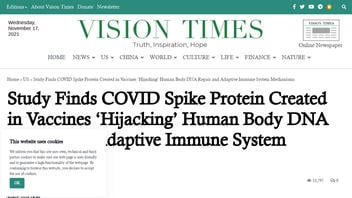CORRECTION -- STORY UPDATED: check for updates below.

Has a Swedish university proved that the COVID-19 vaccine creates spike proteins that are "hijacking" the human body's DNA repair and adaptive immune mechanisms? No, that's not true: The claim was based on a paper withdrawn by the authors after the university in question found flaws in the methodology and conclusions.
The claim was made in a November 4, 2021, Vision Times article titled "Study Finds COVID Spike Protein Created in Vaccines 'Hijacking' Human Body DNA Repair and Adaptive Immune System Mechanisms - Vision Times" (archived here), which opened:
A recent study published by two Chinese scientists working for a university in Sweden has found evidence that the full length spike protein of SARS-CoV-2, the novel coronavirus that causes Coronavirus Disease 2019 (COVID-19), damages a crucial DNA repair mechanism involved in the human body's adaptive immunity.
Users on social media only saw this title, description and thumbnail:
Study Finds COVID Spike Protein Created in Vaccines 'Hijacking' Human Body DNA Repair and Adaptive Immune System Mechanisms - Vision Times
A recent study out of Sweden has found the spike protein on SARS-CoV-2, utilized in COVID vaccines, is damaging the body's DNA repair and active immune systems.
Vision Times claimed the Swedish study shows that the SARS-CoV-2 spike protein "significantly inhibits" the body's ability to repair DNA damage, which is essential to adaptive immunity.
Lead Stories contacted the authors and the research institute where they work, asking if Vision Times interpreted the study properly. No such conclusions can be drawn, wrote Professor Neus Visa, head of the department of molecular biosciences at Stockholm University's Wenner-Gren Institute, in a November 17, 2021, email to Lead Stories. She wrote:
No, the article does not prove that vaccine-generated spike proteins will hijack the human body's DNA repair mechanism and other adaptive immune system reactions. The study uses an artificial setup in vitro that cannot support conclusions about the effects of the spike protein in the body.
Visa wrote that while Stockholm University's research projects are "truth-seeking, free and unbound," peer review is essential. "We have evaluated the research presented in this article and found flaws in the quality of the work and data interpretation and therefore the authors have contacted the journal and requested the withdrawal of the article."
The journal that published it is an "open access" journal, part of a scientific movement to make research available for free, aimed at making new findings more likely to be reviewed, replicated or used as part of even more discoveries.
In contrast, traditional scientific publication often requires readers to subscribe or pay for access to journals. In both cases, peer reviewers strengthen the results by testing methodologies and assumptions. In this case, peer reviewers found sufficient flaws to prompt the university to withdraw the paper, which the journal Viruses has retracted.
Lead Stories wrote to the editors of the journal, Viruses, to learn what steps were taken in response to Stockholm University's request that the article be withdrawn. At the time of writing in 2021, the article was still available, with no notice that problems had been identified.
Reviewing the site in 2024, Lead Stories found Viruses had, one month after Lead Stories' fact check, topped the webpage where the paper was published with an "Expression of Concern," followed in May of 2022 by a full-retraction:
(Source: MDPI.com screenshot taken on Tue May 28 19:24:00 UTC)
Lead Stories on May 28, 2024 renewed its 2021 request for information from editors at Viruses and will update this article when they reply.
Updates:
-
2024-05-26T21:21:33Z 2024-05-26T21:21:33Z CORRECTION: The original version of this fact check used an incorrect definition of "Open Access Journal", incorrectly suggesting all such journals forgo peer review.

















